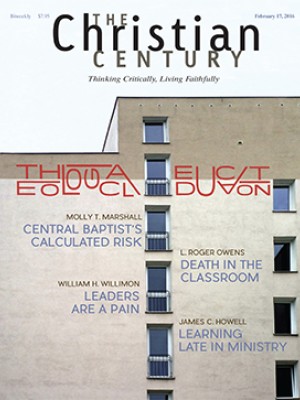March 6, Fourth Sunday in Lent: Luke 15:1-3, 11b-32
All through my twenties, I was fortunate enough to have a mentor. From college to seminary to ordination and beyond, she was always there, carefully balancing gentle encouragement with the not-so-gentle directness of someone who can see through excuses with X-ray vision. In other words, she was excellent at her job.
I bumbled academically through my first few years of college. My mentor helped me focus enough to graduate and get into seminary. Once I was in seminary she encouraged me to ignore the real possibility that my college grades could doom my graduate school applications and to apply anyway.
Read our latest issue or browse back issues.
It was a gamble that paid off. When I packed my car and headed off to get my Ph.D., in the exact same field as hers, she told me how proud she was of me.
There was just one problem: it turns out I was not created to be an academic. Every day in graduate school made me feel like a square peg being pounded into a round hole. So, just shy of finishing my course work, I left.
Driving away, I felt incredibly free. I also felt so worried that I had disappointed my mentor that I didn’t write or call to tell her. Embarrassed at what I thought she would see as my failure, I all but disappeared for the next eight years.
This week’s Gospel text is the story of a son who asks for his inheritance early, goes off to the big city, and promptly hits rock bottom. He is so afraid of how his father will be ashamed of him that he takes a job feeding pigs for a stranger. One day out in the fields, hungry and humiliated, he realizes that even his father’s hired hands are treated better than this. So he sets off for home, expecting no welcome but hoping for just enough grace to be treated fairly as a servant, not a son. He is, after all, a disappointment.
A clergy friend once officiated at the funeral of a gifted young man who took his own life in the face of what felt like a disproportionately large failure. “He felt like he had disappointed everyone who had ever loved him,” my friend said at the funeral. “And he had. And so have I, and so have we all.”
My friend was right. Which is why it is unfortunate that it has become almost a cliché for pastors to preach this text by focusing mostly on the brother who stays behind. He’s the one whose righteous anger is so familiar to all of us who value loyalty and hard work. And yes, this brother should get his due; he lives in each of us.
But so does the other brother. So many of us, even those of us with good jobs and impressive résumés, walk around thinking that we are disappointments to someone we love. Too often, not even our churches let us be the fallen brother who desperately wants to come home. Too often, even in the one place where we should be able to confess our failings and be honest with ourselves, we have to play the part of the one whose greatest sin is his desire for fairness.
I don’t know what the prodigal son feels when he walks up the road to his father’s house that day. I do know what I felt when I opened my e-mail and typed a message to my old mentor after so many years. I know what it is like to wait for a response I am not sure will come. I know what it is like to be prepared for the worst.
It is because I sent that message, though, that I also know what it’s like to find the one you have disappointed running down the road to you, embracing you, and welcoming you home.
My mentor gave me a great gift that day: she told me she was not disappointed in me in the least for quitting my Ph.D. program. As she put it, she would only have been disappointed had I stayed in a place where I was not being true to the person God created me to be. The harder truth was that she was disappointed in me for one thing: I hadn’t given her the chance to tell me this sooner.
We have all disappointed everyone who has ever loved us, God included. That’s real. But so is grace, and the thing about grace is that those moments of disappointment do not define us. Unless, of course, we are so scared of our loved ones’ rejection that we choose to let them.
In Lent we are called home by a God who will come running down the road just to hold us once more. We turn away not from life but from those places in life where we are not true to the person God has created us to be. In this season we find that our failures are indeed real, but that God’s love is so much bigger and better than we could have imagined.
Maybe the only way we could ever truly disappoint God is by believing that we have messed up too much to ever be loved by God again. But even then, even when we refuse to give God a chance, I’ll bet that God will still somehow find us. And in that moment, we will once again be welcomed back home.





